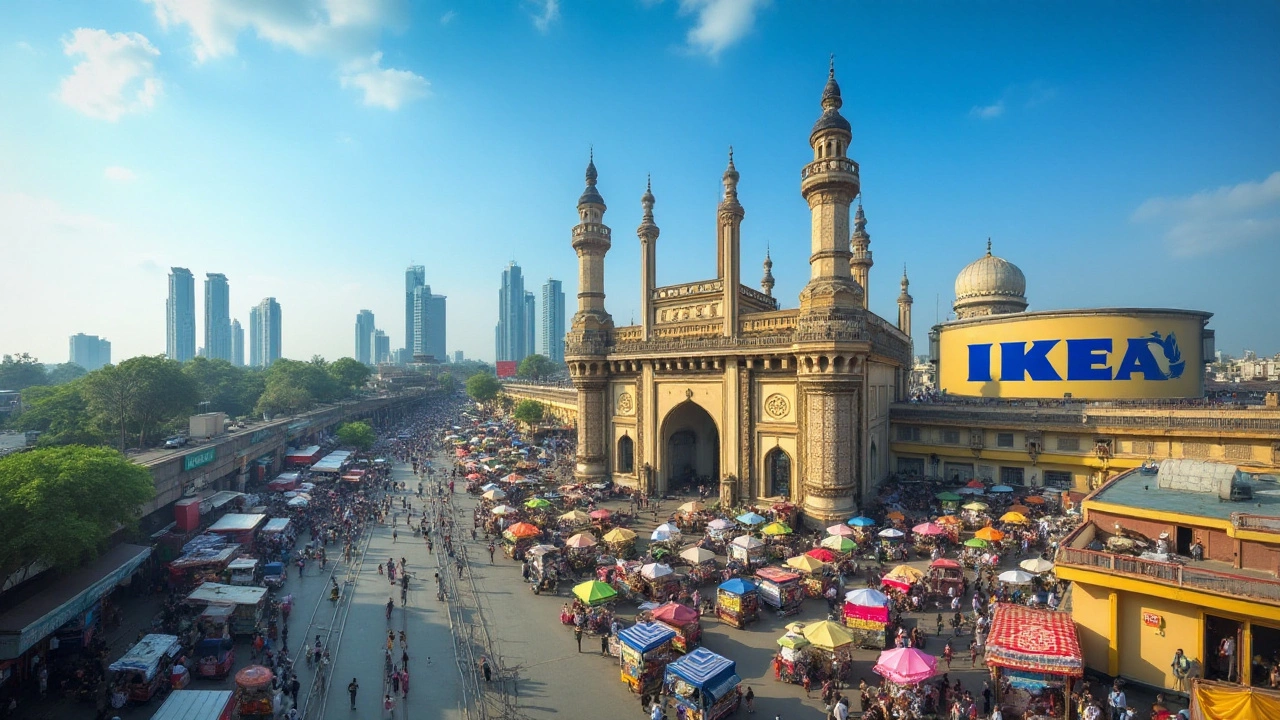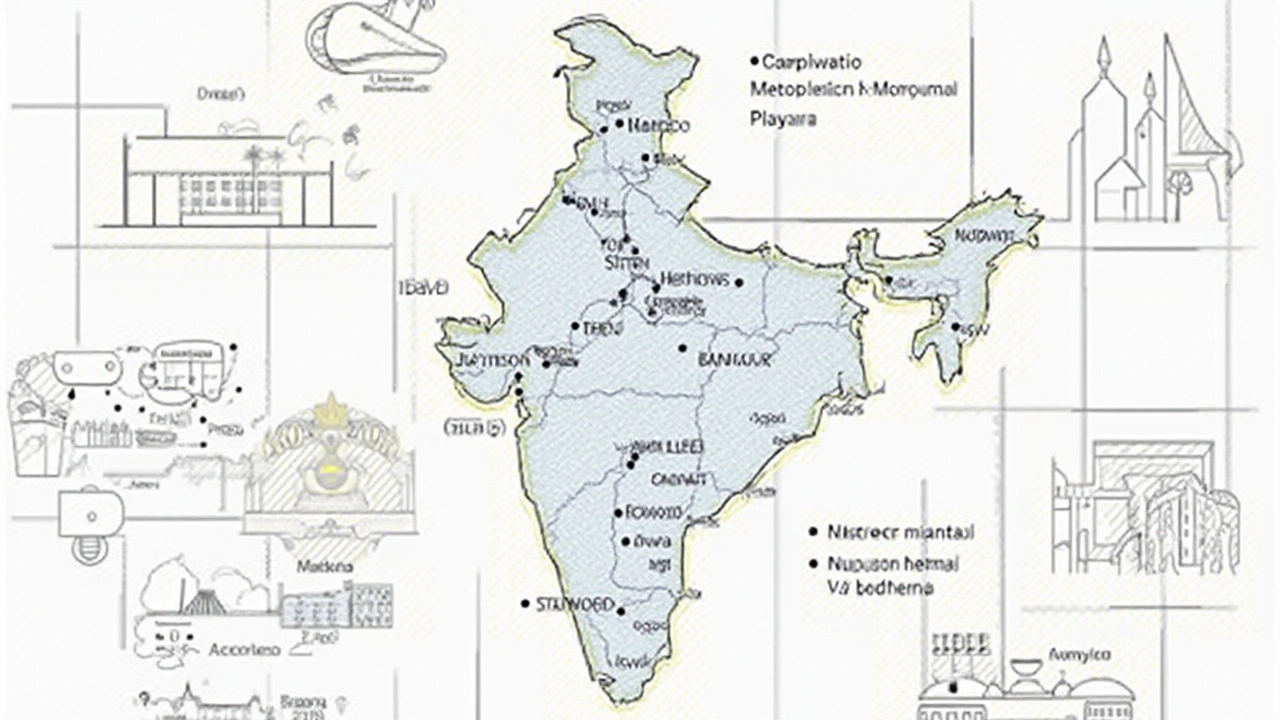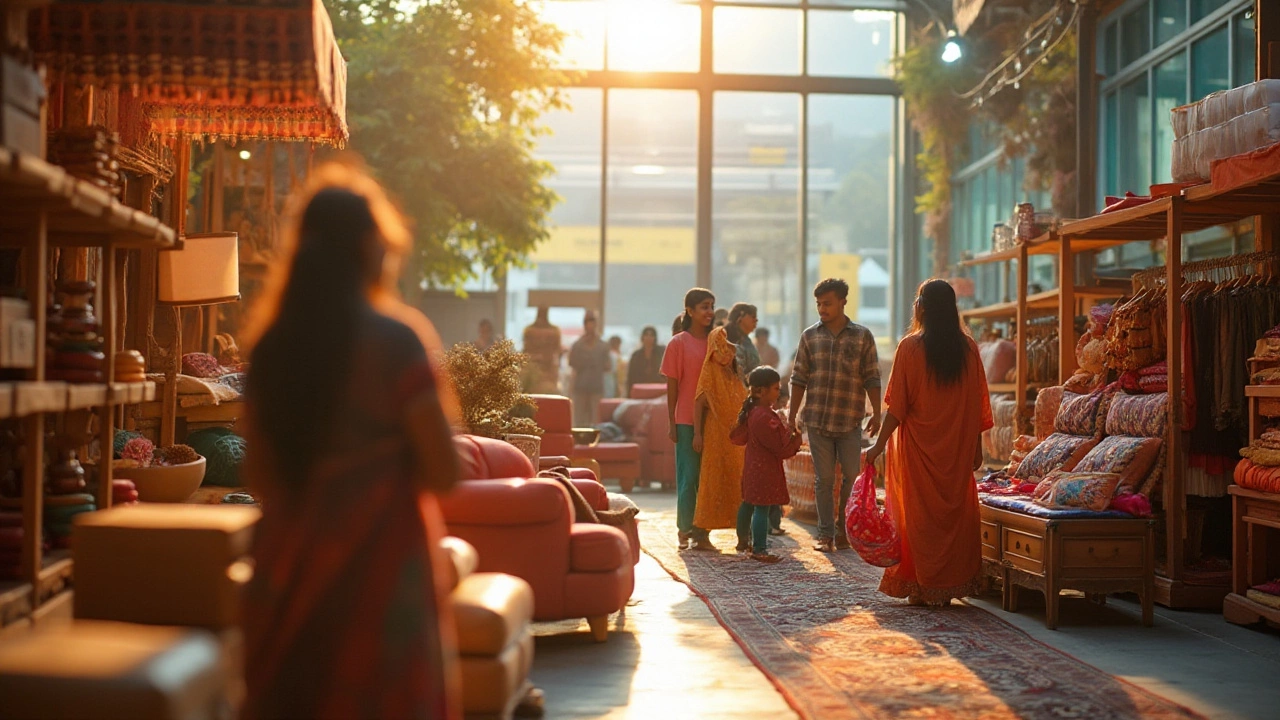IKEA's first and currently only store in India opened its doors in Hyderabad, sparking curiosity and excitement. But why did this Swedish furniture titan opt for Hyderabad, leaving other Indian metropolises waiting in the wings? The answer is as layered as the Scandinavian brand's iconic flat-pack furniture.
Hyderabad, with its bustling economy and thriving middle class, offered a fertile ground for IKEA's combination of affordability and style. It's not just the economic potential; the city's strategic location in South India provides a logistical advantage too. Combining these factors with a metro-friendly market and open mindset towards global brands, Hyderabad became the perfect launchpad for IKEA in India.
- The Arrival of IKEA in India
- Hyderabad: A Strategic Choice
- Impact on Local Furniture Market
- Consumer Reception and Culture
- Future Expansion Plans in India
The Arrival of IKEA in India
It was a momentous occasion when IKEA, the globally renowned Swedish furniture giant, marked its official entry into the Indian market with its store opening in Hyderabad in August 2018. This move was a culmination of over a decade of planning and strategizing to understand and adapt to the diverse and complex nature of India’s consumer landscape. Known for its distinctive flat-pack furniture, unique design sensibility, and the promise of offering functional yet chic home solutions, IKEA's entry into India was eagerly awaited by enthusiasts and industry observers alike.
The journey to finally set foot in India was anything but simple or swift. IKEA's initial intention to open in India dated back to 2006, driven by the burgeoning middle class and their rising aspirations for quality global products. However, navigating India's stringent regulatory environment, particularly concerning foreign direct investment rules, was a formidable challenge. With relaxations in these policies by the Indian government, IKEA was finally able to secure its entry, committing to invest Rs. 10,500 crore in setting up 25 stores across the country over a decade-long plan.
Hyderabad was chosen as the launching pad for IKEA India after extensive market research and due diligence. The city’s demographic and economic profile matched IKEA’s target customer base. More importantly, Hyderabad offered IKEA a cost-effective real estate option compared to other Indian metros, which is a crucial consideration given the enormous size of the typical IKEA store. This strategic selection laid the foundation for what would be an exciting new chapter in IKEA’s expansion story.
According to Patrik Antoni, the Deputy Country Manager of IKEA India, “Hyderabad is a growing city with a vibrant market, there is a growing middle class, increasing urbanization, and expanding consumer base that perfectly fits IKEA’s demographics. It's not just about selling furniture, it's about bringing in the concept of home to life.”
The anticipation surrounding the opening was palpable, with consumers lining up in droves to be among the first to experience IKEA’s famed in-store experience. Spanning over 400,000 square feet, the Hyderabad store is not just a retail outlet; it’s a destination. It features a mammoth showroom, a sprawling self-serve area, and the signature IKEA café serving Swedish cuisine alongside local dishes to cater to Indian tastes.
Beyond the retail space, IKEA's entry into India marked the beginning of a localized approach, employing over 950 employees from the region and engaging around 1500 indirectly. IKEA's commitment to local sourcing was also a part of their strategic plan, aiming to have 30% of its product range produced in India over time. This not only helps in reducing costs due to import charges but also supports the local economy, providing a symbiotic benefit. As India's furniture market continues to grow, currently worth approximately $35 billion, IKEA's presence is expected to usher in a new era of design inspiration and competitive pricing in the home decor industry.
Hyderabad: A Strategic Choice
In an era where the location of a business is as crucial as the product it sells, Hyderabad stood out as a beacon for IKEA's entry into India. The city isn't just a geographic point on the map but a vibrant ecosystem that uniquely supports business growth and innovation. Renowned for its booming IT industry and traditionally known as Cyberabad, Hyderabad has evolved into a melting pot of cultures and industries, making it an attractive choice for global investors. Its cosmopolitan nature, coupled with a huge number of educated and tech-savvy residents, positions Hyderabad as a marketplace ready to embrace global brands like IKEA.
The strategic location of Hyderabad serves as a gateway to southern India, with a well-developed infrastructure that supports both transportation and distribution networks. This makes it easier for IKEA to manage its vast supply chains. Additionally, the city's evolving consumer market, marked by a rising middle class with increasing purchasing power, aligns perfectly with IKEA's target demographic. Hyderabad residents exhibit a growing appetite for stylish and affordable home solutions, and IKEA's vast range of products caters well to this demand.
The state's government policies also play a pivotal role. With investor-friendly policies and a clear mandate to attract foreign businesses, Telangana offers a conducive environment for international brands to launch and expand. IKEA's Hyderabad store, spanning across 400,000 square feet, signifies more than just a retail outlet; it indicates a deep trust in the prospects of the location. Notably, according to the then CEO of IKEA India, the decision to open in Hyderabad was not just about market testing, but about making a long-term commitment to the region.
"Hyderabad offers us a unique opportunity to connect with the Indian consumer by understanding cultural diversities and preferences," IKEA's former CEO, Peter Betzel, once remarked. This insight reflects how deeply the company analyzed local nuances before making its move.
Another substantial factor was the ability of Hyderabad to adapt to international retail trends while preserving cultural authenticity. The city boasts a rich history, and this fusion of the old with the new is what appeals to brands aiming for a multicultural presence. IKEA capitalized on this, designing its store to accommodate local tastes and preferences, which reflects in their offerings like masala boxes, tandoor sets, and even a wide variety of flavored biryanis in their restaurant. This blend of global brand with local flavor exemplified their strategic initiative to not only enter the Indian market but to belong in it.
The numbers speak for themselves, as the overwhelming footfall since the store's opening indicates successful traction in an otherwise nascent market for international furniture brands. This decision, influenced by accessibility, demographics, and policies, has paved the way for Hyderabad’s increasing visibility on the global retail stage, with IKEA at its helm, guiding the narrative forward.

Impact on Local Furniture Market
The establishment of IKEA in Hyderabad has stirred the dynamics of the local furniture market in several profound ways. Before the arrival of this IKEA store, the market was predominantly reliant on small-scale manufacturers and traditional businesses, which catered primarily to a local clientele with a taste for classic wooden furniture. These businesses offered bespoke designs that were tailored to cultural preferences, but often lacked the scalability and modern designs that IKEA is famous for. In response to the global giant’s entry, many local players found themselves at a crossroads, necessitating innovation and adaptation to thrive alongside this new competitor.
One of the immediate impacts was the push towards efficiency and modernization. Local furniture makers, faced with the efficient and cost-effective operations of IKEA Hyderabad, began to reconsider their own production methodologies. Many adopted streamlined processes and explored bulk production techniques, trying to emulate the Swedish giant's exemplary supply chain strategies. They also began to look more seriously at consumer trends, trying to incorporate more contemporary, minimalist designs that could potentially appeal to younger urban professionals who might be drawn to IKEA's offerings.
Moreover, the arrival of IKEA sparked a price war that invariably benefited consumers. With access to a range of European-styled furniture at affordable rates, customers had more bargaining power and greater choice than ever before. This shift encouraged local businesses to reevaluate their pricing structures and offer competitive prices without compromising quality.
"IKEA’s entry into Hyderabad has redefined value for money in furniture shopping," remarked a local furniture industry expert in a recent Times of India interview.The direct effect was a more consumer-centric market where the focus shifted to better service and more value-driven deals.
The ripple effect also extended to employment. IKEA has created numerous jobs in its Hyderabad store, ranging from retail positions to logistics roles. This not only provided employment opportunities but also raised the bar for employment standards and practices within the sector. Local companies, eager to retain their workforce, have been prompted to enhance their working conditions and offer better incentives. Additionally, some local suppliers managed to secure contracts with IKEA, providing them raw materials or semi-finished products, thus integrating themselves into a global supply chain and boosting their business prospects.
Finally, another interesting impact has been observed in terms of customer engagement. Inspired by IKEA's immersive showroom experiences, many local retailers have started to rethink their own retail spaces. Some have adopted more interactive and engaging in-store experiences, allowing customers to visualize how pieces might fit into their homes. This shift towards experiential shopping has led to a richer customer journey and fostered a deeper connection between brands and consumers.
Consumer Reception and Culture
The opening of IKEA in *Hyderabad* marked a turning point in consumer habits, especially for those seeking a balance between classic elegance and modern utility. As soon as IKEA's doors swung open, throngs of shoppers were drawn in by the promise of Swedish quality coupled with affordability. From the onset, it was clear that the *Hyderabad* populace was more than ready for the DIY phenomenon that IKEA is renowned for globally. The store's constant flow of customers has demonstrated the eagerness and acceptance towards innovative living solutions that IKEA brings.
One intriguing aspect of consumer behavior has been the attraction towards IKEA's modular offerings. The openness to modular furniture marks a significant shift from traditional, ornate Indian furniture, with locals showing a keen interest in mixing Scandinavian minimalism with Indian aesthetics. The ability to customize and assemble pieces on their own resonates with consumers looking for personalized home environments. Many customers, especially younger ones, have embraced the opportunity to craft living spaces that reflect both global trends and individual tastes.
"IKEA has effortlessly blended into our lives not just as a store, but as a part of our home-building journey," remarks Sunita Sharma, an enthusiastic shopper who visited IKEA on its opening day.
The cultural adaptation of *IKEA Hyderabad* didn’t remain restricted to shopping habits. IKEA has adeptly integrated local influences into its store offerings, which plays a pivotal role in consumer reception. This localization strategy includes the introduction of locally popular products and food items in its famous restaurant, thereby offering more than just furniture. It’s about creating a holistic experience that subtly bridges Swedish design principles with Indian sensibilities, driving curiosity and affection from the consumers. For instance, the presence of vegetarian fare and dishes that align with regional tastes have further endeared IKEA to its Indian audience.
Moreover, *IKEA Hyderabad's* entry into the Indian market has sparked intriguing conversations about sustainable living. Many in *Hyderabad* are exploring sustainable lifestyle products and environmentally-friendly furniture options. This aligns with a rising trend among the urban population, who are increasingly concerned with the environmental impact of their purchases. This has been well received, and is mirrored in the store's recycling efforts and commitment to sustainable sourcing, a testament to IKEA's global environmental ethos meeting Indian values.
Interior design workshops and family-friendly events have also played a part in creating a unique cultural space, inviting individuals to not just shop but engage with others in a community-driven setting. Additionally, the integration of Indian cultural elements within IKEA's in-store campaigns highlights the brand’s effort to connect with local customs and celebrate India's diverse cultural expressions.
The success of IKEA in *Hyderabad* is largely tied to its ability to resonate with this dynamic consumer culture, illustrating that comprehending local preferences is key to thriving in the global marketplace. As IKEA continues to entrench itself within the cultural fabric of the city, it remains attentive to consumer trends, making adaptive and continuous engagement the cornerstone of its strategy in India.

Future Expansion Plans in India
As IKEA looks to broaden its horizons in the Indian subcontinent, eyes are naturally drawn to the possibilities of new store openings. The initial success in Hyderabad acts as a beacon, hinting at what could be the start of a broader Indian journey. Several reports have suggested that the company is setting its sights on major cities like Mumbai, Bangalore, and Delhi for its upcoming stores. The urban centers are not only bustling with potential customers but also align with IKEA's strategy of tapping into areas with a growing middle class eager for affordable, quality furniture.
The company’s expansion plans are driven by a meticulous approach to understanding the Indian market. Recognizing the diversity across this vast nation, IKEA's plans involve localized adaptations in their product range and marketing tactics. This includes creating products that cater to the smaller home sizes prevalent in urban India or showcasing vibrant colors that appeal to Indian tastes.
"India is a key market for us," stated an IKEA spokesperson in a recent interview, "and we're committed to growing here sustainably and responsibly."Many industry experts believe that this thoughtful approach will serve as a competitive advantage over other global furniture brands attempting to establish a foothold in India.
One of the intriguing elements of IKEA's strategy includes an emphasis on a multi-channel presence. While brick-and-mortar stores in various cities are on the cards, they are also heavily investing in enhancing their online platform. This serves as a bridge to reach customers in smaller towns and rural areas who may not have immediate access to a physical store. The online experience IKA offers is designed to provide the same level of customer satisfaction, with detailed product descriptions, virtual room settings, and even augmented reality features that help consumers visualize products in their homes before purchasing.
Planning for future store launches in India also involves significant logistical and operational investments. IKEA has already been investing in local supply chains and has aims to source up to 50% of its products from within India in the coming years. This isn't just a smart business move but also an effort to foster local craftsmanship and contribute to the Indian economy. By integrating more locally sourced materials, IKEA doesn't just reduce costs but also resonates more deeply with Indian consumers who value supporting local production.
Looking forward, it's expected that IKEA's India expansion will create numerous jobs across the sectors it touches. This isn't limited to retail positions but includes opportunities in logistics, manufacturing, and supply chain management. With an eye towards sustainable growth, IKEA is committed to not just selling furniture in India but becoming a part of the community and contributing positively to the economic landscape. How extensive this expansion becomes will be worth watching, as more cities could soon welcome the familiar blue and yellow exteriors of new IKEA stores.
